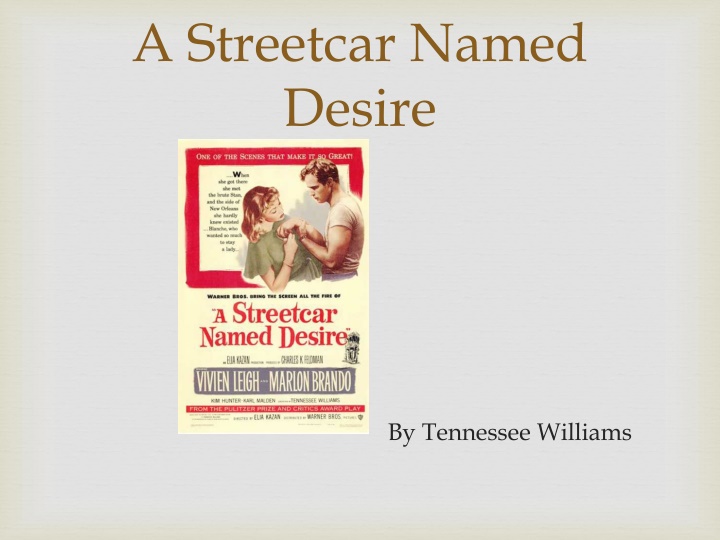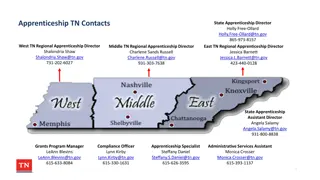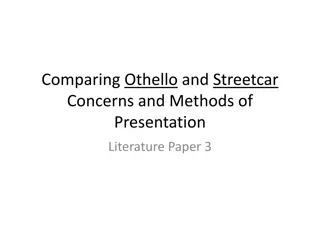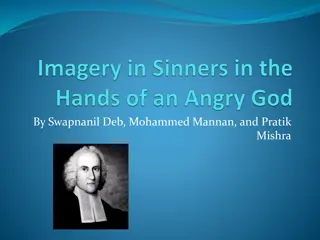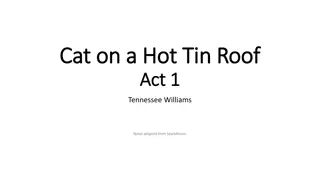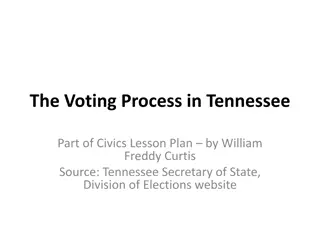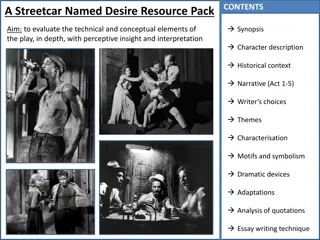Insights into Tennessee Williams' "A Streetcar Named Desire
Explore the portrayal of fragile characters in Tennessee Williams' iconic play "A Streetcar Named Desire." Learn about the playwright's influences, the setting in late 1940s New Orleans, and the symbolic references within the narrative. Delve into the complex relationships and societal forces that shape the characters' destinies in this Southern Gothic masterpiece.
Download Presentation

Please find below an Image/Link to download the presentation.
The content on the website is provided AS IS for your information and personal use only. It may not be sold, licensed, or shared on other websites without obtaining consent from the author.If you encounter any issues during the download, it is possible that the publisher has removed the file from their server.
You are allowed to download the files provided on this website for personal or commercial use, subject to the condition that they are used lawfully. All files are the property of their respective owners.
The content on the website is provided AS IS for your information and personal use only. It may not be sold, licensed, or shared on other websites without obtaining consent from the author.
E N D
Presentation Transcript
A Streetcar Named Desire By Tennessee Williams
According to Williams, the play is about: the ravishment of the tender, the sensitive, the delicate, by the savage and brutal forces of modern society
Tennessee Williams Born March 26, 1911 Columbus, Mississippi Died February 24, 1983 New York City Occupation Playwright Genre Southern Gothic Influences Anton Chekhov, D. H. Lawrence, August Strindberg, Hart Crane
Who was Tennessee Williams? Williams is thought to have been able to identify with a fragility and vulnerability in women and once said: I draw every character out of my very multiple split personality. My heroines always express the climate of my interior world at the time in which those characters were created. From an early age, Williams used writing as an escape from a world of reality in which [he] felt acutely uncomfortable . He lived in New Orleans from 1938, a bohemian place where all manner of behaviour was tolerated, if not encouraged. It was here that he was inspired to create Streetcar. It is said that he saw, on the Vieux Carr , two streetcars. One was named Desire and the other Cemetery which he thought was somehow symbolic of life itself.
The When and the Where The play takes place in the late 1940s in New Orleans Industrialization and urban growth flourished in many cities, while plantations continued to decline and decay. The southern social hierarchy continued to break down. Post World War II society - Women generally went back to working inside the home after the war. - Baby Boom started
Elysian Fields - In Greek and Roman mythology, Elysium was the place of rest for the dead who were blessed by the gods. Eventually, it became the destination of anyone who had lived a righteous life. The Kowalskis live on Elysian Fields Avenue.
Characters Stanley Kowalski Stella s husband Stella Kowalski Stanley s wife, Blanche s younger sister Blanche Dubois Stella s older sister Harold Mitchell (Mitch) Stanley s friend Steve Hubbell Friend of Stanley, lives above the Kowalskis Eunice Hubbell Wife of Steve, friend of Stella
Cultural Conflict Williams is an almost completely non-political writer. He began to move away from writing about the large political issues to writing about the emotional burdens of everyday life. The tensions in this play come partly from cultural conflict the worlds of Stanley and Blanche are so opposed that neither can understand the other. Stanley = New South, American dream Blanche = Old South, rigid views on society
Theatrical Elements Expressionist features (eg music, lighting used to represent the workings of the protagonist s inner mind) allow the audience to experience the psychic condition of the central character Symbolism: Williams structures Streetcar using a vast array of imagery arranged in patterns of opposition. As Williams himself said symbols are nothing but the natural speech of drama the purest language of plays
Movie Trailer https://www.youtube.com/watch?v=u9YgJjSCT08
Vocabulary Scenes 1-3 1. Raffish adj. gaudily vulgar; cheap 2. Cosmopolitan adj. familiar with and at ease in many different countries and cultures. 3. Incongruous adj. not in harmony; inconsistent 4. Dubiously adv. doubtful; questionable
Vocabulary Scenes 1-3 5. Highbrow adj. intellectual; scholarly 6. Implicit adj. unquestioning; absolute 7. Abscond v. to depart in a sudden and secret manner, especially to avoid capture and legal prosecution
Vocabulary Scenes 1-3 8. Reproach v. address someone in such a way as to express disapproval or disappointment 9. Indolently adv. lazy; wanting to avoid activity 10. Portiere - n. a curtain hung over a doorway
Vocabulary Scenes 4-6 1. Earnest adj. resulting from or showing sincere and intense conviction 2. Serene adj. calm; peaceful; untroubled 3. Deluded v. impose a misleading belief upon (someone); deceive; fool
Vocabulary Scenes 4-6 4. Narcotized v. to make dull; stupefy; deaden the awareness of 5. Sentimental adj. of or prompted by feelings of tenderness, sadness, or nostalgia. 6. Stolid adj. (of a person) calm, dependable, and showing little emotion or animation.
Vocabulary Scenes 4-6 7. Coquettishly adv. (of a woman) characteristically flirtatious especially in a teasing, lighthearted manner. 8. Bohemian adj. a person, as an artist or writer, who lives and acts free of regard for conventional rules and practices.
Vocabulary Scenes 4-6 9. Temperamental adj. given to erratic behavior; unpredictable 10. Effeminate adj. (of a man or boy) having traits, tastes, habits, etc., traditionally considered feminine
Journal #1 In a well written journal, respond to the following prompt. Reference specific details from the text to support your ideas and analyze this text critically. PROMPT: Select 3 characters from the play and discuss -what each character desires -how these desires are seen in their words & actions -what you predict will happen later in the plot based on these desires
Vocabulary Scenes 7-11 1. Saccharine adj. excessively sweet or sentimental 2. Contemptible adj. deserving contempt; despicable. 3. Degenerate n. an immoral or corrupt person. 4. Recrimination n. an accusation in response to one from someone else.
Vocabulary Scenes 7-11 5. Uncouth adj. lacking good manners, refinement, or grace. 6. Repertoire n. the collection of dramas, operas, parts, pieces, etc., that a company, actor, singer, or the like, is prepared to perform 7. Sinuous adj. having many curves and turns.
Vocabulary Scenes 7-11 8. Malarkey n. meaningless, foolish talk 9. Inert adj. lacking the ability or strength to move. 10. Prodigious - adj. remarkably or impressively great in extent, size, or degree
Journal #2 How does The Good Wife s Guide relate to the characters in the play? Things to think about: -Is Stanley or society more to blame for how he treats Stella? -In what ways has Blanche disrupted the Kowalskis life? -Do you think Blanche desires to be a good wife ?
